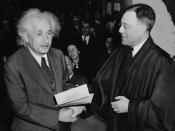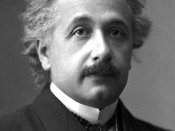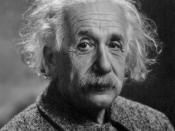Albert Einstein's relativity has changed forever the way we think about space, time and the universe. In two papers published in 1905, he proposed a new way of looking at motion, mass and energy, and in 1915 he postulated a new conception of gravity. His 1905 papers on special relativity were just a part of his remarkable "miracle year," whose 100th anniversary physicists worldwide are celebrating with the World Year of Physics.
Some scholars have even suggested that Einstein's relativity affected such fields as art, poetry, philosophy and history. In a 1983 book on the history of the 20th century called Modern Times, British historian Paul Johnson chose to date the beginning of the modern world not at the beginning of the century, or even at the outbreak of World War I, but instead on May 29, 1919.
This was the date of a total solar eclipse in South America and Africa, during which astronomers measured the bending of starlight by the sun's gravity, thus confirming Einstein's general theory of relativity. Johnson went on to argue that the success of relativity in science was accompanied by the rise of "moral relativism" in politics and ethics, leading to many of the great catastrophes of the 20th century.
That proposition may be debatable, but what is certain is that relativity has changed physics. Special relativity underlies everything we understand about light, atoms, nuclei and quarks, and is now part of the standard toolkit of every working physicist.
General relativity has been part of a sea change in astronomy. Whereas once the universe was seen as a quiet place of steady, fixed stars and wispy nebulae, it is now a jungle out there, with its exploding supernovae, colliding galaxies, mysterious black holes and, of course, that most violent of all events, the...


